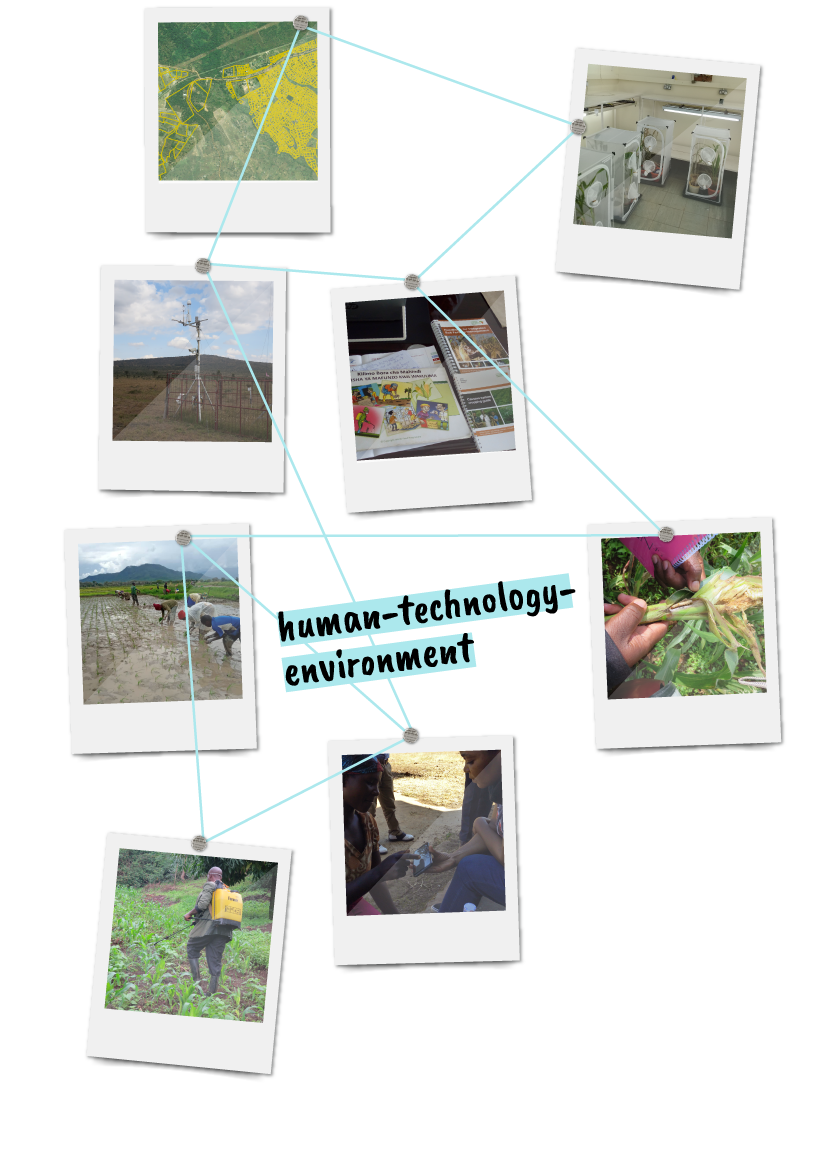RESEARCH/
Smart Futures
Taking debates on Information and Communication Technologies for Development (ICT4D) as point of departure, the project studies how future-related agricultural knowledge becomes mediated through digital technologies, and how such technologies, in turn, form a decisive part of future-making in rural Africa today.
A digital vision for rural Africa
Information and Communication Technologies (ICTs) are often perceived as promising tools to help farmers tackle new uncertainties arising from changes in their environment, volatility in markets and land use. Development projects particularly aim to achieve this by providing access to knowledge about future events and developments (e.g., weather forecasts, price developments). Employing a critical reading of this narrative, the project addresses three interrelated questions, focusing on the ways in which mobile services in the agricultural sector are made and inform farming practices: (1) What visions of development for rural Africa are mediated through mobile information services? (2) How do mobile services, by linking scientists, development actors and users, translate probabilistic futures into risk-mitigating instructions? (3) How do mobile services, by providing a specific kind of knowledge and guidance, transform human-nature relationships, i.e. the way users perceive and act on nature?
About Apps, Data and AI in East African Agricultural Settings
The project follows an ethnographic approach, conducting research with a wide spectrum of actors involved in ICT in agriculture in East Africa. These include farmers, scientists, technology developers, experts in NGOs and agricultural research departments. New actors from the ICT sector have considerably changed the mechanisms through which agricultural futures are envisioned and realized. That ICT4D initiatives are characterized by new logics and dynamics of digitalization, datafication and experimentation in combination with an entrepreneurial rhetoric became apparent while Julia studied influential policies and events in this field. Research on particular cases shows a more nuanced picture of how these touch ground in African agricultural settings: in Tanzania, Astrid gains insights on mobile mapping for land rights, an Artificial Intelligence system informing crop advice and digital learning applications for farmers. Julian conducts research on an SMS-based weather forecast service and mobile apps in pest and disease management in Kenya. During long-term ethnographic engagement we find that the development practitioners’ visions hardly materialize in a straightforward manner in rural areas of Kenya and Tanzania but rather lead to a hybridization of digitally mediated expert knowledges and more place-based practices and experiences. After all, technologically fixing mobile phones, apps, satellites, drones and tablets in agricultural production and intensification processes turns out to be challenging - if not an impossible endeavour.
A digital vision for rural Africa
Information and Communication Technologies (ICTs) are often perceived as promising tools to help farmers tackle new uncertainties arising from changes in their environment, volatility in markets and land use. Development projects particularly aim to achieve this by providing access to knowledge about future events and developments (e.g., weather forecasts, price developments). Employing a critical reading of this narrative, the project addresses three interrelated questions, focusing on the ways in which mobile services in the agricultural sector are made and inform farming practices: (1) What visions of development for rural Africa are mediated through mobile information services? (2) How do mobile services, by linking scientists, development actors and users, translate probabilistic futures into risk-mitigating instructions? (3) How do mobile services, by providing a specific kind of knowledge and guidance, transform human-nature relationships, i.e. the way users perceive and act on nature?
About Apps, Data and AI in East African Agricultural Settings
The project follows an ethnographic approach, conducting research with a wide spectrum of actors involved in ICT in agriculture in East Africa. These include farmers, scientists, technology developers, experts in NGOs and agricultural research departments. New actors from the ICT sector have considerably changed the mechanisms through which agricultural futures are envisioned and realized. That ICT4D initiatives are characterized by new logics and dynamics of digitalization, datafication and experimentation in combination with an entrepreneurial rhetoric became apparent while Julia studied influential policies and events in this field. Research on particular cases shows a more nuanced picture of how these touch ground in African agricultural settings: in Tanzania, Astrid gains insights on mobile mapping for land rights, an Artificial Intelligence system informing crop advice and digital learning applications for farmers. Julian conducts research on an SMS-based weather forecast service and mobile apps in pest and disease management in Kenya. During long-term ethnographic engagement we find that the development practitioners’ visions hardly materialize in a straightforward manner in rural areas of Kenya and Tanzania but rather lead to a hybridization of digitally mediated expert knowledges and more place-based practices and experiences. After all, technologically fixing mobile phones, apps, satellites, drones and tablets in agricultural production and intensification processes turns out to be challenging - if not an impossible endeavour.

